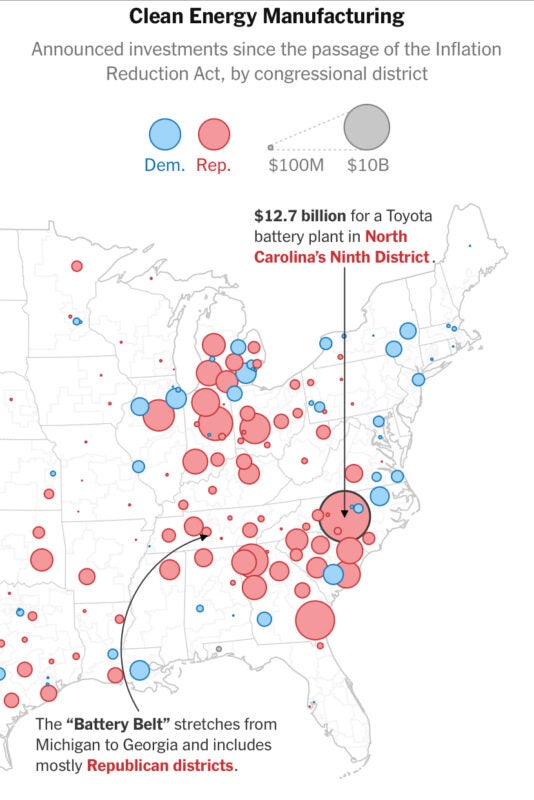As the noise in Washington continues, many more of you are contacting us to ask what you can do to help defend the future of solar grants and incentives.
For starters, we just want to acknowledge again that we’re in this with you. We aren’t exactly known here at the Holler for standing idly by in the face of injustice. We’ve been working alongside a number of allied organizations to lobby our Congressional Delegation to protect the solar economy both in the short and long term. We’ll continue that work for as long as it takes and encourage you to commit whatever time you can to doing the same.
Before we get to the “how to”, here’s where we currently stand:
- While anything is possible, we’re still assuming that pre-committed funds are very likely to flow again. So if you’ve been approved for a solar grant and are just awaiting disbursement, hang in there. Hopefully we’ll see movement soon.
- The solar tax and direct pay benefits are still in effect. They cannot be repealed by Executive Order.
- Our focus now should be on protecting the longevity and future state of solar grants and federal benefits as Congress enters budget negotiations. To achieve that, we need our representatives to understand what these programs have done for local economies, farmers, nonprofits, small business owners, and others in their districts.
![]() This is where y’all come in. We need you to tell your stories. Call or write your representatives to share how solar has impacted you personally. Highlight the incentives that made it possible and what you’ve been able to reinvest in your business or community with the savings solar provides. The key is to give them authentic and relatable anecdotes that bring these programs to life and to follow that with a clear request.
This is where y’all come in. We need you to tell your stories. Call or write your representatives to share how solar has impacted you personally. Highlight the incentives that made it possible and what you’ve been able to reinvest in your business or community with the savings solar provides. The key is to give them authentic and relatable anecdotes that bring these programs to life and to follow that with a clear request.
What exactly should you ask them to do?
- Ensure that pre-committed funds are disbursed as promised, as quickly as possible.
- Protect solar grants and programs in budget reconciliation.
- Ensure a strong solar grant program is re-authorized in the upcoming Farm Bill.
- Ensure the 30% baseline tax benefit remains intact for commercial, residential, and Direct Pay investors.
If you want to include a point or two about the broad success and importance of these programs, here are some ideas:

Source: The Clean Economy Tracker by Atlas Public Policy and Utah State University. By Harry Stevens/The New York Times.
Bipartisan Success:
- Solar grants are successful! The Rural Energy for America grant, for example, is a well-run program that’s had a decades-long track record of bipartisan support.
- The solar tax credit has been extended under Administrations of both parties (including Trump in his first term).
- Just this past summer, 18 House Republicans asked their leadership NOT to axe clean energy tax credits.
- Since the solar friendly legislation passed in 2022, private companies chasing the tax breaks have announced plans to spend $165.8 billion to build factories that make solar panels, wind turbines, electric vehicles and more. Roughly 80 percent of those investments are in Republican congressional districts, where they are creating a once-in-a-generation manufacturing boom.
Energy Dominance and Growing Demand:
- By promoting homegrown and innovative energy technologies, solar grants and other incentives lower energy costs and bolster energy independence.
- The tax benefits and grant-supported projects help address America’s unprecedented increase in energy demand, and threats to grid resilience, by encouraging investment in efficient, diversified systems that can be deployed quickly.
Click on your representative’s name for their contact info:
Thanks for joining us in this important work. Our cause is strengthened when we raise our voices and share our stories together.
West Virginia Congressional Delegation
Congressional Representative Carol Miller
Congressional Representative Riley Moore
Kentucky Congressional Delegation
Congressional Representative Thomas Massie
Congressional Representative Andy Barr
Congressional Representative Harold Rogers
Virginia Congressional Delegation
Congressional Representative Griffith H. Morgan
Ohio Congressional Delegation
Congressional Representative Michael A. Rulli
Congressional Representative David Taylor
Congressional Representative Troy Balderson





